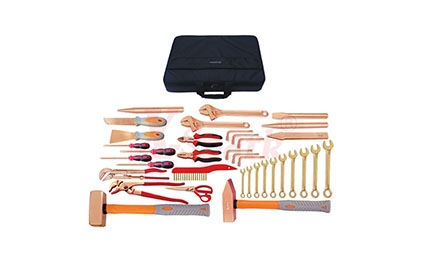What Are Non-Sparking Tools And What Are They Made Of?
As you may already know, there are many highly specified tools for different types of work. Wrench, screwdriver, welding torch, pipe calibration pliers, as long as you can think of, this is the tool to do the job. One type of tool is made differently from other tools. So, what are non-sparking tools, and what are they made of?
What are non-sparking tools?
Such tools are made of non-ferrous metals, which means they are alloys that do not contain iron. They have two unique properties. First, non-spark tools, as the name suggests, do not spark. This makes them very suitable for working in flammable environments. The second unique feature, also due to the lack of iron, is that they are also non-magnetic tools.
What are non-sparking tools made of?
These great tools are made of several different alloys.
Not only are plastic tools a "must-have" list for everyone, but they are unattractive and never spark.
Beryllium copper is the strongest and hardest copper alloy with a tensile strength of 1280-1480 MPa. Beryllium copper tools are essential tools for the toughest jobs.
Brass tools are slightly more expensive, they are durable and have an aesthetic sheen. These tools may change color, but this will not reduce their quality.
Bronze is conductive but does not produce sparks. These tools have a long history in mechanical engineering and combat and are an excellent addition to any toolkit.
Aluminum copper is a lighter alternative to many heavier copper-based alloys. Although not as strong as beryllium alloys, this alloy can maintain its performance.
Do non-sparking tools need special care and storage?
It is important to remember that non-sparking tools are not as strong as steel tools. For this reason, depending on the working environment and maintenance of them, they wear out faster. It is strongly recommended to perform detailed maintenance on your tools to extend their service life.
Consider the following suggestions:
—Choose the right size to complete the right task and prevent the tool from falling.
Avoid contact with corrosive products, such as iron or other contaminants, which may affect non-sparking performance.
—Please clean the non-sparking tools after use to avoid deterioration of the tools.
-Do not use non-sparking tools in an environment with acetylene, as it may cause explosive acetylene.
-Always check non-sparking tools that may be worn, such as hammers or striking wrenches.
If you are a young professional craftsman or welder and are seeking to build a decent toolkit for a profitable career, non-sparking tools are essential. There are many projects that require you to work in highly flammable places, or on magnetic equipment that could yank the tools right out of your hand.

Non-sparking Tool
Next: Proper Use of a Hammer